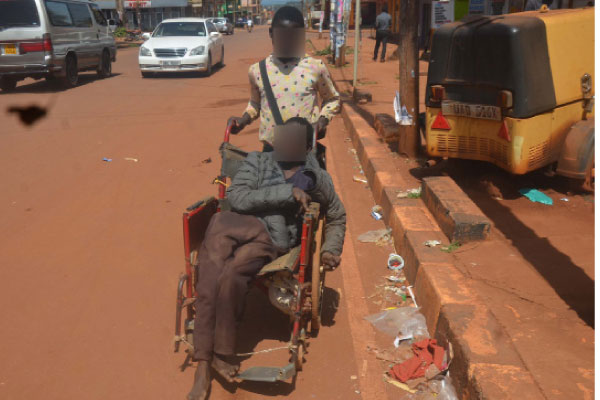Patients resort to street begging

A patient suffering from cerebral pulse in a wheel chair on the streets of Jinja City. PHOTO/TAUSI NAKATO
What you need to know:
- Individuals with health afflictions exploit their ailments for financial survival through street begging, showcasing the challenges they face and the broader societal issues tied to healthcare accessibility and population growth.
Some patients are living off their ailments by taking to the streets to seek financial assistance from unsuspecting members of the public.
These patients suffer from physical disabilities, cerebral paralysis, hydrocephalus, partial or total blindness, body and facial swellings; and minor abrasions to their cheeks, legs, stomach, and neck, among other afflictions.
They employ diverse tactics, such as hitting the streets at 8 am when people are heading to work. Some travel across districts, and return home after accumulating considerable sums.
Their activities involve navigating from door to door, approaching people in offices, markets, taxi parks and shops. This is particularly evident in urban centres, often with the company of spouses or children, especially when the patient faces visual or physical impairments.
Individuals with physical disabilities and cerebral paralysis are often maneuvered in wheelchairs. To overcome the challenges posed by language barriers, megaphones broadcasting pre-recorded messages in the specific language of the region prove to be quite useful.
Ms Fatuma Kwagala, 35, a resident of Kinawambuzi Village, Bukaboli Sub-county in Mayuge District, acknowledges living off her ailment—a tumor on her cheek.
“I have had this tumor for five years. I went to Mulago Hospital, and was referred to CoRSU Hospital where I was asked for Shs15m. I am financially unstable and decided to move on the streets to collect some money,” she says.
She adds: “Every day, I collect between Shs100,000 and Shs120,000, and since I am a single mother of four children, I use part of the money for food and save up to Shs80,000 a day. From this money, I also pay rent of Shs30,000 and pay school fees for my children.’’
Ms Kwagala says she had saved some money intending to address her own health concerns but used it to treat her mother who suffered a stroke.
She seeks financial assistance in Mayuge Town Council, Iganga Municipality, and Jinja City. Having exhausted these avenues, Ms Kwagala now plans to extend her efforts to Kampala.
Raymond, 13, a pupil at Rayan Primary School in Iganga District, says during weekends and holidays, he moves with his 15-year-old brother, whom cerebral paralysis has confined to a wheelchair.
He says they navigate Jinja City, collecting funds to support themselves, their sister, and mother.
“Each day, we collect between Shs30,000 and Shs40,000. Our father died and our family members chased away our mother. The family later sold the land. We collect money for food, clothing and school fees. If it was not for our sick brother, I don’t know how we would survive,’’ he says.
Another case involves Ms Madina Nabirye, a resident of Namutumba District, who reportedly lost both eyes in a domestic fight.
She roams different towns, including Jinja City, with her two children, collecting between Shs60,000 and Shs70,000 per day to fund an eye operation and meet domestic needs.
What people say
The Director of Makerere Business Forum, Mr Fred Muhumuza, says some patients who beg on the streets do not want to recover from their illnesses.
He adds that many diseases often involve expensive treatments while some are not treatable in smaller health centres.
Dr Francis Lokor, a senior consultant at Oral Maxillofacial Surgeon at Mulago Hospital, says such operations are provided free of charge at Mulago, highlighting the need for patients to follow through with scheduled appointments.
The former Kagoma County MP in Jinja District, Prof Frank Nabwiso, says uncontrolled population growth is forcing Ugandans to become street beggars.
“France is richer than all African countries because its population is small,’’ he says.
Background
Last July, Daily Monitor published a story of a couple from Nebbi District, which was begging from Jinja streets, in search of Shs4m to treat an 18-year-old tumor (Ameloblastoma).
Ms Jennifer Acen, 35, and her husband, Mr Joseph Ongei, 43, a resident of Akuru Village, Akworo Sub-county in Nebbi District, were moving with prescription documents and megaphone, asking for contribution to foot their hospital bill.
This publication established that the couple was collecting at least Shs300,000 in Jinja City each day, and following the publication of their story, the couple received Shs20m.
Reports later emerged that her husband’s number, was later disconnected.
Later, sources divulged that Ms Acen had turned down an offer to be operated free of charge allegedly upon the advice of her husband.
It took the intervention of Nebbi Resident District Commissioner, Mr Robert Abak, who arranged for Ms Acen’s successful surgery at Mulago Hospital.
Mr Abak later told Daily Monitor that his team found the couple “enjoying music with very expensive items”.




